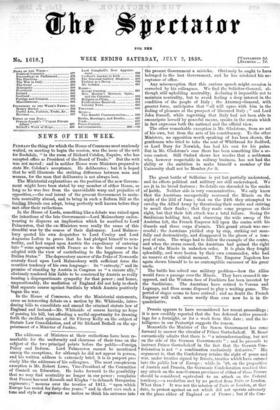NEWS OF THE WEEK.
PERHAPS the thing for which the House of Commons most anxiously waited, on meeting to begin the session, was the issue of the writ
for Rochdale, "in the room of Richard Cobden, Esquire, who has accepted office as President of the Board of Trade." But the writ was not moved ; and in neither House were Ministers prepared to state Mr. Cobden's acceptance. He deliberates ; but it is hoped that he will illustrate the striking difference between man and woman, for the man that deliberates is not always lost.
The Ministerial explanations on the position of the new Govern- ment might have been stated by any member of either House, so long as he was free from the unavoidable warp and prejudice of opposition —the real intent of the present Government to main- tain neutrality abroad, and to bring in such a Reform Bill as the leading liberals can adopt, being perfectly well known before they met after their reelections.
In the House of Lords, something like a debate was raised upon the intentions of the late Government—Lord Malmesbury endea: vonring to disprove an implication which he ascribed to Lord Palmerston, that the ex-Ministers were really the cause of this dreadful war by the course of their diplomacy. Lord Malmes- bury quoted his own despatohes to Lord Cowley and Lord Augustus Loftus to prove that he had pledged himself to neu- trality, and had urged upon Austria the expediency of entering into "some agreement with France as to the best course to be adopted with the view of contributing to the happiness of the Italian States." The deprecatory answer of the Duke of Newcastle scarcely fixed upon Lord Malmesbury with sufficient force the manifest tendency of his own language : its "entreaty," and its promise of standing by Austria in Congress as "a sincere ally," obviously rendered him liable to be construed by Austria as really bearing a disproportionate sympathy for that power ; and hence, unquestionably, the mediation of England did not help to cheek - that separate course against Sardinia by which Austria positively began the war.
In the House of Commons, after the Ministerial statements, arose an interesting debate on a motion by Mr. Whiteside, intro- ducing bills to consolidate and amend the criminal statute law of England and Ireland—Mr. Whiteside of course having no hope of passing his bill, but affording a useful opportunity for drawing forth the stedfast opinions of Sir Fitzroy Kelly on the subject of Statute Law Consolidation, and of Sir Richard Bethel on the ap- pointment of a Minister of Justice.


























